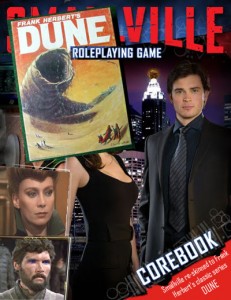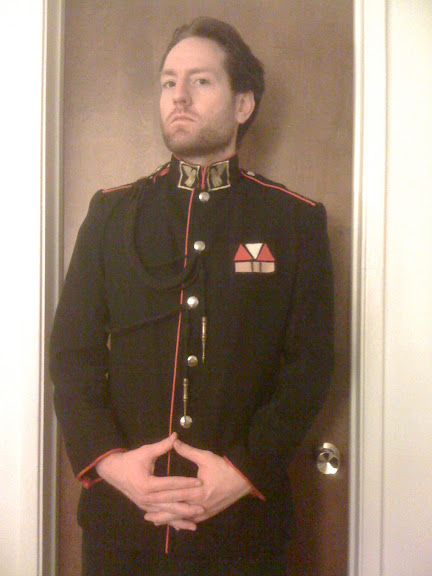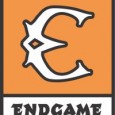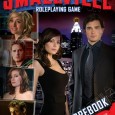 GM: Sean Nittner
GM: Sean Nittner
Players: Karen Twelves, Regina Joyner, Basil Benitz and Jon Edwards
System: Smallville
Story Behind the Game
I’ve got a story to tell about this game. It started in November or December, whenever I submitted my game. I was sitting on two books that I wanted to read but wasn’t feeling much impetus to do so: Smallville and Dune (you know the 1965 original by Frank Herbert, yeah that Dune).
So I did what I always do when I really want to learn a game, I promised to run it. And following suit, I promised to run it in the Dune setting. Well, that meant for some reading for me.
My experience with Dune
Most of Frank’s writing I despise. I can not stand listening to people thinking. I want the author to show me what they think through words and actions and when in doubt leave me a little uncertain. His insistence to present a hard sci-fi would be commendable if not for the constant juxtaposition with total pseudo-science. Like many male authors he can not write a compelling female character unless she falls into a very few stereotypical roles: manipulative bitch, submissive servant, or psychotically loyal mother. Some characters filled just one of these (The Reverened Mother Helen only taking the first, Channi only taking the second) and others filled multiple (Jessica was all three at different times) but at the end of the day, the female parts were caricatures in comparison to the male roles. Finally, Paul has got to be one of the biggest Mary Sues I have ever encountered. He’s a Mentat, and a Bene Gesserit, and the Kwisatz Haderach, and prescient, and a weapons master, and endured more pain than anyone else ever had, and a savvy political leader, and charismatic, and lovable by all, and courageous, and a wormrider, and a member of the Fremen, and a member of the royal house, and the Emperor, and, and, and, and, and, and… It actually got me thinking about an “Ultimate Mary Sue Deathmatch”. We’d pit Wesley Crusher vs. Paul Atredies and then let Drizzit cut up the winner his two magical scimitars and his damn black cat!
Okay, so if I have all this hate for Dune, why did I run a game there? I mean besides that I committed to run the game before reading the book. Because for all that crap, Franks world is AWESOME. He has some an amazing landscape of political powers, mystical abilities, harsh environments, crazy cultures, religious customs, awesome technology, and the kitchen sink. I mean, Frank was writing 45 years ago and some of the idea he had still haven’t been rivaled in the Sci-Fi genre. For all his crappy plot, Frank made an amazing world, one which I was VERY excited to run a game in.
My Smallville experience
Smallville had almost the opposite effect when I read it. Reading it I grew to love the game so much I almost considered watching the show. And this was a game that I started reading with significant trepidation. I had played the Serenty system a few times and been very disappointed with Cortex system. I didn’t think it was some kind of abomination that some made it out to be, I was just extremely underwhelmed by it. Yet several people that I really respect (notably Ryan Macklin and Leonard Balsera) told me the game was made of awesome, printed in golden awesome lead paint and then dipped in awesome sauce. So I checked it out… and they were right.
Pathways: Character creation in Smallville is some of the coolest I’ve seen. The pathways system is a mix of Lifepaths from Burning Wheel, Story guest starring from Fate/SotC/Dresden, and a Location/NPC generation system all rolled into one. By the end of character creation, a beautiful (and complication) web of connections is established between all the PCs (Leads) and NPC (Features and Extras) in the game.
Values: In lots of game your ability to accomplish a goal is roughly based on (or affected by) your character’s proficiency at the task you’ve chosen to accomplish that goal. So, in D&D you’re ability to charm a princess is affected by your Diplomacy skill, But even in PTA your ability to win a conflict about making magical wine is based on edges or connections that are relevant to said wine making. And of course there are currencies to affect this (plot points, hero points, fan mail, artha, etc) but the core role is based on the characters skill or at least association with the task at hand. Smallville doesn’t has if you know how to do something (or at least not a first), it asks why you are doing something, and who you are doing it for. Mechanically you are always rolling a value (like Love or Truth) and a relationship (like Clark, or Paul) and when you roll those you’re making sure the statements you’ve made about them (e.g. the Truth must be known) are in line with your action… And if it isn’t in line, you get one moment of awesome turmoil and conflict followed by a changing of that value later. This alone makes the game killer in my mind.
Wedges. Adventure creation in Smallville is pretty radical in its concept. Since the game is primarily about the Leads (PCs) interacting with each other, all of the story written is designed to put pressure on those interactions. So, when making an adventure the first thing you are guided to do (which I’ll Illustrate below in my example) is look at the relationships between the Leads and see how you can hammer on them in a way that seems external to the character. I’ve already started using this in other games. Two cops are chasing a perp. One cop has a soft spot for people who are poor. The other is a by the books officer. When they arrested a poor guy who was just trying to make enough money to feed his family, I compelled the sympathetic cop to let him off easy, and watched the madness ensue. These external pressure cookers are wedges, and the system of building the wedges into an “adventure” is awesome.
Duneville, download the game.
For the first time I have an entire game typed up and in a format that I can easily share, so I’m going to do just that. Here’s links to everything in the game. Note, in order to get the character sheets to look and print property, you need to download and install three fonts (all of which free): Minion Pro, Forgotten Futurist, and Orthodox Herbertarian. Without these the sheets will look… weird.
Character Sheets (Make sure to get those fonts): Jessica, Stilgar, Jamis, Gurney
Relationship Map: Four conflicts
Wedges and Reveals
Player Cheat Sheet and Dune synopsis
Dune Glossary
Premise
Also, you need the basic premise of the game, which I realized I haven’t written down yet. Here it is: About half way through the first book a you upstart named Jamis challenges Paul and Jessica’s admittance into the tribe. He invokes the “Amtal rule” which forces a fight to the death with Paul. In the book Paul has the first time when his prescience fails him. He’s at a nexus of possible futures and doesn’t know the outcome. In the book, he kills Jamis, cementing his roll (and Jessica’s) as part of the Fremen and getting him one step closer to being their prophet. In my version, Jamis wins and in killing Paul inherits his prescience (hey don’t knock it, Frank did way wackier), but unlike Paul hasn’t been trained all his life to prepare for it so the flashes of the future just blow him away.
So, what we’ve got is Jamis who thinks the world of himself and just got amazing powers. Jessica, who no longer has status in the tribe but desperately needs them to fight the Harkonnens, help her continue her duties to the Bene Gesserit and avenge Duke Leto’s betrayal, Stilgar, who really wants Jessica to be a Fremen but doesn’t have a legitimate way to do that now, and needs to redirect the rambunctious Jamis before he tries to make a claim for leadership. Finally we have Gurney arriving (also a minor change, this was two years earlier than it happened in the book), looking for Paul to lead the assault against the Harkonnens and absolutely sure that Jessica is the traitor that betrayed his lord (Duke Leto).
Game opens at Paul’s funeral just as Gurney is being forced into the caves by Sardaukar troops… and GO!
Props
My props for this game were in some ways extravagant, in others very basic.
The character sheets (see the attached files) were remade from the Smallville Lead sheets. I swapped out the background for a dune image, added in form fields, and removed the Asset/Value/Trigger grid and replaced it with a text block for each ability that looked like the entries from the book itself.
I replaced “plot points” with “spice pills” for my game and represented those spice pills with orange Tic-Tacs. Simple, but nice.
I had started making a box of pain to hold the trouble dice in, which would double as a die roller and a temptation to the players to put their hand it. Having cut up a copper sponge and left the sharp bits pointing into the opening, it would have indeed hurt quite a bit to put your hand it (without causing any you know, real injury) but even as a prototype it was catching the dice and that was going to be a real problem. In the end I didn’t have time to finish it.
The other prop that never happened was a table full of sand. Since the miniatures tables at EndGame have fairly tall borders on the edges I wanted to lay a tarp down on the table and then cover it with sand. Sadly that was going to be too problematic to clean up, so that prop was also take off the table (bad pun very intended).
The final and most excellent prop however, was my Atreides uniform, which I wore as the ghost of Duke Leto Atreides. This was a lot of fun to make and reminded me throughout the game of my regal personal.

Opening Scenes
Wow… all that prep before actually talking about the game, which was all kinds of awesome.
The game starts off intense. We introduce Gurney above the cave with his men in a Thopter being shot down by the Harkonnens and eventually pushed into the caves with the Fremen below.
After a few exchanges done in the name of the dead Duke Leto, the camera pans down below, inside the caves where we see the funeral ceremony just as it comes to an end and Jamis is given the chance to say the final words “Paul was my friend…” and then take something of his.
Those where the opening scenes. All that I had specifically planned for the game (except the reveals to keep agitating things) was out there, from here on it was all about what the Leads brought… and they brought a lot!
Actual Play
Jamis closes the ceremony, says the words and walks over to Jessica, an outsider. “This is what I claim” and he points at her! Boom instant conflict, where Stilgar actually backs Jamis and he takes Jessica as his own servant, initiating a seitch orgy right next to Paul’s still water filled body. Fans of the book will note that Jessica was three weeks pregnant with Alia (Duke Leto’s daughter) at the time, which is all the better because Jamis will fully claim the child as his own when it is born.
As the Atredies soldiers move in the caves and come into contact with the Fremen guards Stilgar leads a force to fight off the intruders, which is all inclusive of Gurney, the Atreides soldiers, and the Harkonnens. In the fray and heat of battle Stilgar and Gurney meet, recognizing each other as mutual friends of Duncan Idaho and opt to ally if temporarily, against the Harkonnens.
By the time the battle is finished Gurney has met Jamis, the man that killed Paul and found he was utterly unremorseful. In fact, quite surprised to find out he killed a duke. When he is led back and see’s Jessica there, it is crystal clear to Gurney that Jessica betrayed both father and son!
It was pretty much a four way death match from there on. Each of them vying for their own ends. Gurney to have Jessica confess to being a traitor. Jamis trying to take power. Stilgar trying to hold onto his leadership and make allegiances with these powerful figures, and finally Jessica, just trying to stay alive long enough that she can give birth to the new Atreides heir (which she genetically manipulated to become a boy in her womb, such that he might take the place of Paul).
My wedges, Channi, Harah, Baron Harkonnen and Thufir Hawat all worked both directly and through intermediaries to keep the tensions high, but it was hardly necessary, the leads were at each other’s throats.
A particular violent outbreak occurred when Jamis took Paul’s water, forced Jessica (now his servant) to drink it, and then shared it with all the tribe. That would have been volatile enough, if not for Stilgar taking the water and pouring it out on the ground, wasting the most precious substance in existence to prove a point. Beneath the cave was a secret reservoir of water, which combined with thousands of others would eventually turn Arrakis in a paradise. Well that was all wonderful and grand, but he just poured Paul on the ground! That’s when knives came out and things just got insane.
To diver the internal conflicts briefly I brought in my classic distraction. The reverend mother traveling on a palanquin and a wormsign spotted. At this point it was time for some heroics that cemented Gurney as a friend to the Fremen (by saving Jamis’ wife and children), Jamis as the leader (both by saving the reverend mother and by his interaction with Stilgar, see next), Stilgar as… dead (swallowed by a sandworm after his was crippled by Jamis, being killed like the previous leader of the Fremen Liet), and Jessica as the servant who despite many threats on her life and a very demeaning role in the Fremen society a woman who held onto her duties and, without Jamis’ knowledge would bear the Artreides heir.
Some tweets that happened during game.
GM: So, Jamis, as part of the funeral you can take one thing of Paul’s. Jamis: I claim his mother, Jessica. #dune #minicon #yesikilledpaul
“Well, I’m just going to take my Paul and go home!” *grabs bottle of Paul Atreides’s life water* #dune #minicon #yesikilledpaul
Jessica’s my servant, Gurney’s not mad, Stilgar’s dead, I’m the Mahdi. Everything’s coming up Jamis! #dune #minicon #yesikilledpaul
What rocked
The situation was so damn volatile, I hardly needed to prod it. We had a 4 hour time slot with about 20 minutes of chit chat and announcements in the beginning. I swear the game was 3:40 of non-stop conflict, resolution and change.
My players were SO intense. I mean they dived in to this game with both feet. I had a few moments when I had to stop the game, make sure it wasn’t getting to intense, and then we jumped back into the action.
All of the Leads had spectacular accomplishments and/or tragedies. It was epic.
The system (except as noted below) was very each for people to pick up on. Many values and relationships were challenged and overall, I loved the way the mechanics flowed.
What could have improved
For all that I loved the conflicts between the lead, it was almost too much. I ended the game with a headache, feeling like I just got off a four hour roller coaster. Conflict needs texture, moments of peace or unison to make the conflict distinct and meaningful. Even though everything I saw was awesome, I think the game would be richer with a few breaks in the action, some down time. Even if those just came from you know, taking an actual “break” in the game, which we didn’t either.
One issue with the game itself is that the Assets are somewhat confusing in that it looks (on the character sheet) like the triggers must be used in order to invoke the aspect. I think separating those out might actually help clarify using assets in rolls versus using their triggers.
Conflicts that end with stress, rather than with someone giving in don’t have narration instructions. I think this may be the only issue I have with the book. How to narrate someone losing a conflict without giving in needs to be explicit, as well as some examples of how to be “stressed out”. I found I was having difficulty when nobody wanted to give and someone couldn’t beat a roll. Result was you take stress, but the other guy hasn’t really won yet. Kind of wet noodlely for me.
Jon pointed out after the game that it was nearly exclusively player interaction, which is fine, but takes a different mindset going in. I did include the “what players are responsible for” in my reference sheet and mention that the important developments were between the leads but I didn’t emphasize it enough. As this is going to be the focus of all my Smallville games going forward, I should work on making that more explicit up front.


Ah, I See Now…
The way I narrate it is that the character just took a blow that hurt. Say Bill and Natasha are arguing over an information leak in their monster hunting cell. Bill wants Natasha to admit that she’s in love with the vampire, but Natasha wants to hide it. If Natasha fails a roll and doesn’t give, she takes stress. Maybe she’s now Afraid of what Bill will do to her if he finds out. He still doesn’t know, as he didn’t get his goal.
That sound good. I just wish they worded it more like “taking stress is like taking the blow [expand on taking the blow from DitV here], it’s not the end of the contest”.
But now I know… and knowing plus 25% Red Lasers and 25% Blue Lasers is ALL the battle!
Glad I could help! On that note, I apparently need to find my lasers…